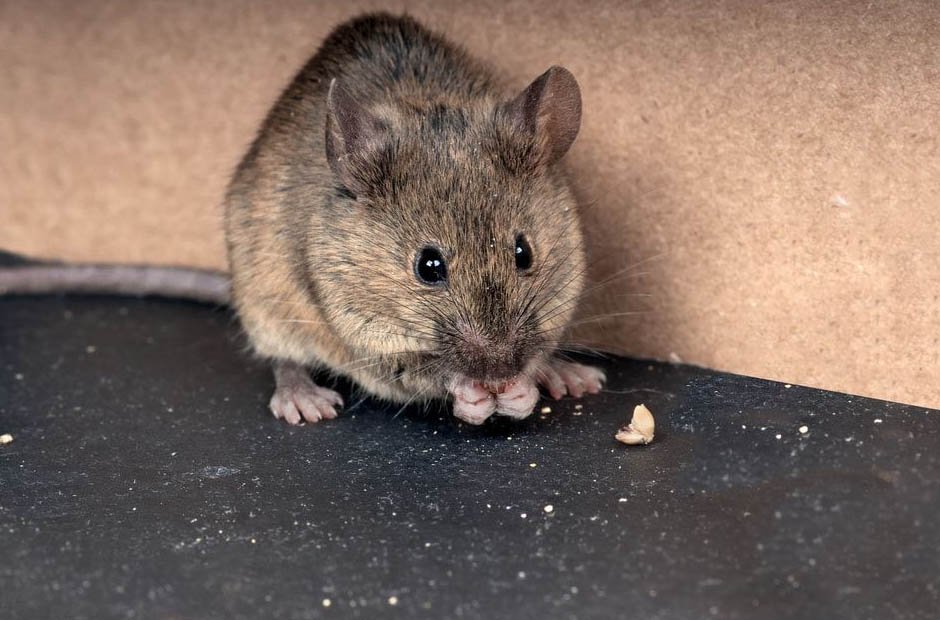Dealing with a mouse infestation in your home can feel overwhelming. These tiny and elusive creatures are not good for you and your family health.
This article aims to provide steps that can effectively and safely help you remove mice from your home.
Table of Contents
Natural Methods to Deter Mice
Use of Peppermint Oil
Peppermint oil is a natural and effective method to deter mice from your home. Mice dislike the strong smell, so it can be used as a natural repellent.
To use peppermint oil, simply soak cotton balls with the oil and place them strategically around your home, especially near entry points or areas where you’ve noticed mouse activity.
Replace the cotton balls every few days to maintain the scent.
You can also create a spray solution by mixing 1 cup of water with 20 drops of peppermint oil and use it to spray around baseboards, doors, and windows.
Get a Cat
One of the best ways to prevent mice from entering your home is by having a pet cat. Cats naturally prey on mice making their presence a strong deterrent.
If you currently don’t have a cat, you might consider adopting one from an animal shelter or rescue organization.
Which Mouse Traps Should I Use to Catch Mice?
To effectively get rid of mice in your home, it is crucial to select the right mouse traps. There are a variety of traps on the market, each offering different features and benefits. Here are some options to consider.
Snap traps: These are the classic, wooden or plastic traps with a spring-loaded bar that kills the mouse upon contact.
They’re affordable and can be placed in strategic locations where mice are likely to pass by. They can be difficult to set and can cause injury to users if not handled properly.
Glue traps: These sticky traps immobilize mice, which are then disposed of. They are easy to use and can be placed in tight spaces that other traps might not suit. Glue traps can be viewed as inhumane due to the prolonged suffering that the trapped mice experience.
Electronic traps: Battery-operated electronic traps kill mice quickly and painlessly through a high-voltage shock. Although they’re more expensive than snap and glue traps, they’re efficient and don’t pose a risk of injury during setup.
Some popular electronic mouse traps include the OWLTRA Indoor Electric Mouse Trap and the Victor Electronic Mouse Trap.
Live traps: For those who prefer a more humane approach, live traps capture mice without causing them harm. Once caught, the mice can be released outdoors away from your home. These traps can be reusable, making them cost-effective in the long term.
The trap you choose should depend on your specific situation and personal preferences. Evaluate your home for areas with mouse activity and take your budget, the infestation level, and your stance on humane methods into consideration when selecting traps.
What is the Best Poison for Mice?
When dealing with a mice infestation in your home, you might consider using mouse poison as an effective solution. Here are some of the best mouse poison options you can consider:
Bell Contrac Blox Rodent Control Rodenticide
This ranks as the best overall option. This product contains bromadiolone, an anticoagulant rodenticide that effectively kills mice. Bell Contrac Blox can be used both indoors and outdoors and is attractive to rodents due to its all-weather composition.
Neogen Ramik Green Weather-Resistant Rodenticide
This mouse poison offers excellent value for your money. It contains diphacinone, a multi-feed anticoagulant, which makes it an attractive bait choice for mice. Neogen Ramik Green is designed for any weather conditions, making it suitable for use in both indoor and outdoor environments.
Motomco Tomcat Rat and Mouse Bait
This might be your best option. These pellets are easy to use and can be placed in bait stations or other strategic locations. They contain bromethalin, a potent neurotoxin, which is highly effective for killing mice.
Professional Pest Control Services
Sometimes, DIY methods may not be enough to tackle a mice infestation in your home. In such cases, it’s wise to consider hiring professional pest control services.
Experts like Terminix and Orkin are well-equipped to handle mice problems and can create a customized treatment plan for your home.
When it comes to cost, expect to pay around $250 for a one-time treatment. If you choose an annual plan, the initial visit can cost between $100 and $250, with follow-up visits ranging from $50 to $150.
Keep in mind that these prices may vary depending on the severity of the infestation and the size of your property.
Professional pest control services can save you time and effort by effectively dealing with mice infestations.
Understanding Mice Behavior
Mice are small rodents that can easily infiltrate your home and cause substantial damage to your property if not dealt with swiftly. By understanding their behavior, you can effectively prevent and solve mice infestations.
Mice are primarily nocturnal creatures, which means they are most active at night. They have an incredible sense of smell, and they use it to locate food sources. This also means they can detect and avoid poison and dangerous substances.
Keep your home clean and free of uncovered food to avoid attracting them.
Mice have a strong instinct to reproduce, leading to rapid increases in population if left unchecked. A single female mouse can give birth to up to ten litters per year, with an average of six pups per litter.
Identifying Signs of Mice Infestation
Physical Damage
Mice can cause various types of physical damage to your home. Look for gnaw marks on wires, furniture, and walls.
Mice Droppings
Typical signs of mice infestation include their droppings. Mice droppings are small, dark, and pellet shaped. If you notice droppings scattered around your home, especially in areas such as the pantry, behind appliances, or inside drawers, there’s a good chance you have mice infestation. The more droppings you find, the larger the infestation might be.
Noise and Smell
Mice are often heard scurrying around within walls, ceilings, and floors, particularly during nighttime hours when they’re most active. Pay attention to scratching, scampering, or gnawing sounds that might indicate their presence.
Cleaning Up After Mice
When cleaning up after mice, it’s crucial to take appropriate safety precautions to avoid any potential health risks. Make sure to wear rubber or plastic gloves and consider using a face mask for added protection.
Begin by creating a cleaning solution consisting of 50% water and 50% bleach. Spray the mice’s urine, droppings, and any surrounding areas with this mixture.
Allow it to soak for about 5 minutes. After the solution has soaked in, use paper towels to wipe up the urine, droppings, and bleach mixture. Dispose of the paper towels in a sealed plastic bag and place it in the trash.
If you find any dead mice, follow these steps:
- Put on your gloves and prepare a bleach/water solution.
- Spray the dead mouse and its immediate surroundings with the bleach/water mixture.
- While wearing gloves, pick up the dead mouse using a plastic bag or paper towels.
- Dispose of the rodent’s body safely outside and seal the bag before placing it in the trash.
During the cleanup process, make sure to keep doors and windows open to provide proper ventilation. You should also avoid sweeping or vacuuming the affected area, as this may spread contaminants into the air.
Conclusion
To effectively eliminate mice from your home it’s important to locate where they’re getting in and seal off those entry points. Inspect the exterior of your house for cracks, holes or gaps that could be access points, for these rodents.
After securing these entryways you can try using deterrents like cinnamon, apple cider vinegar or peppermint to discourage mice from returning.
Another helpful approach is to place traps in areas where mice are most active such as basements, attics and crawlspaces. There are types of mouse traps including snap traps, glue traps and live traps. Remember to check the traps dispose of any captured mice in a responsible manner.
Maintaining a clutter free home is also crucial in deterring mice. In areas where food is stored. Store your food in sealed containers promptly clean up any crumbs or spills and remove any hiding spots by decluttering unnecessary items.
If all else fails despite your efforts, it may be necessary to seek assistance from a pest control specialist.
FAQs
Which smells help deter mice from entering?
Mice typically avoid certain smells that can be used to deter them from entering your home. Some of these scents include cinnamon, apple cider vinegar, dryer sheets, clove oil, peppermint, tea bags, mint toothpaste, ammonia, cloves, and cayenne pepper.
When should I call a professional exterminator for a mouse issue?
If you’ve tried various DIY methods to get rid of mice and your problem persists, it may be time to call a professional exterminator. A professional exterminator can assess the severity of the infestation, identify the source, and use targeted treatments to eliminate the mice from your home.










